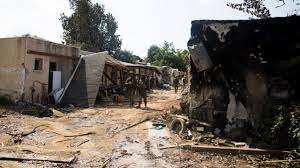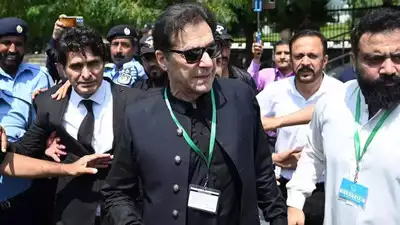Kibbutz Kfar Aza serves as a microcosm of the initial days of this war and offers a glimpse of what may unfold in the future. Until Tuesday morning, ongoing combat was witnessed in this kibbutz, situated along the Israeli border with Gaza. Consequently, the collection of the bodies of Israeli residents, who lost their lives when Hamas breached the border wire from Gaza early on Saturday, is just commencing.
Soldiers, spending much of their day recovering civilian bodies from the wreckage, describe what appears to be a massacre, primarily occurring during the initial hours of the Saturday assault. The Israeli military, caught off guard, took 12 hours to reach the kibbutz.

Davidi Ben Zion, the deputy commander of Unit 71, an experienced paratrooper team leading the assault, expressed gratitude for saving many lives but noted the aggressiveness of the attackers. He referred to the Hamas gunmen as a relentless “jihad machine,” targeting unarmed civilians.
Evidence of war crimes by Hamas gunmen is accumulating, as demonstrated by Kibbutz Kfar Aza. Like their Israeli neighbors, the community was taken by surprise, with the first line of defense being residents with military experience patrolling the perimeter. These guards were killed in the fight.
This unexpected attack has shocked and angered Israelis, who never anticipated a breach in their defenses or such a loss of life. Their frustration is mixed with incredulity that the state and military failed to protect them.
The bodies of dead Hamas gunmen, who killed many Israelis, remain exposed in the kibbutz, as well as their used motorcycles and paraglider wreckage.
The future likely holds more fierce battles to reclaim Kfar Aza, as hundreds of Israeli combat soldiers still guard its perimeter, exchanging gunfire across the border with Gaza. Israel is grappling with a collective trauma, having lost many of its citizens on Saturday.
In Gaza, hundreds of civilians are also losing their lives, raising concerns about a grave violation of the laws of war by Hamas. Major General Itai Veruv insists that Israel is respecting its obligations under the laws of war, but criticisms are mounting.
These experiences in Kfar Aza are shaping the resolve of soldiers and the unity of the Israeli people in the face of the ongoing conflict. Decomposing flesh and constant alerts for rocket fire serve as a grim backdrop in this turbulent situation.






